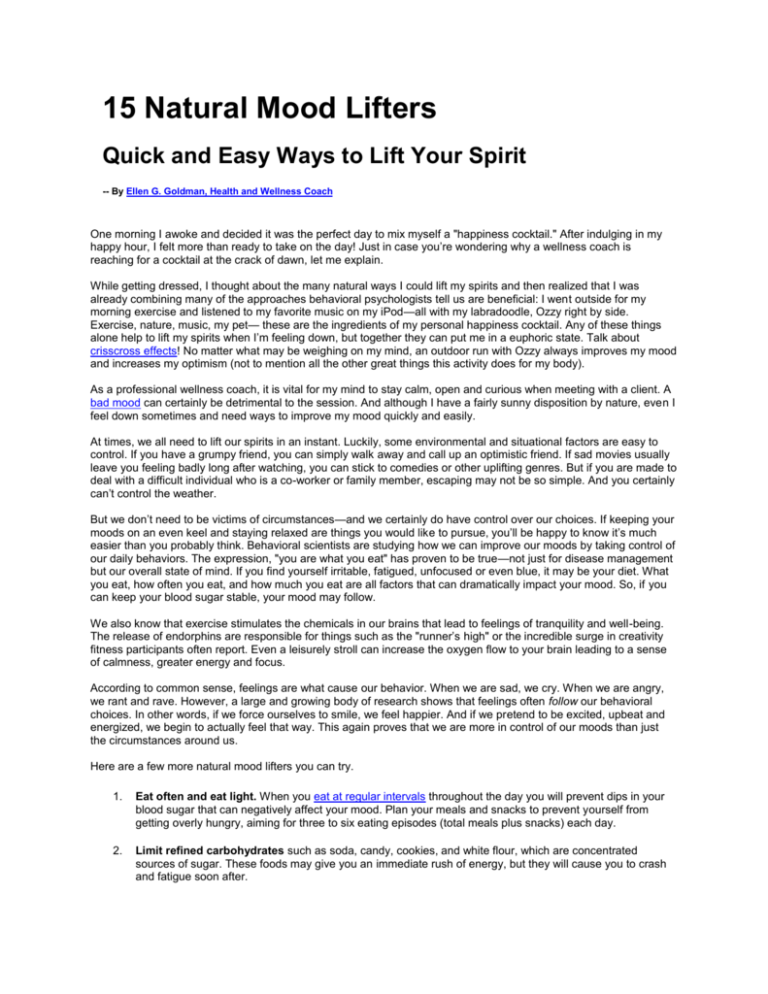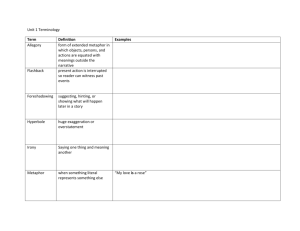15 Natural Mood Lifters
advertisement

15 Natural Mood Lifters Quick and Easy Ways to Lift Your Spirit -- By Ellen G. Goldman, Health and Wellness Coach One morning I awoke and decided it was the perfect day to mix myself a "happiness cocktail." After indulging in my happy hour, I felt more than ready to take on the day! Just in case you’re wondering why a wellness coach is reaching for a cocktail at the crack of dawn, let me explain. While getting dressed, I thought about the many natural ways I could lift my spirits and then realized that I was already combining many of the approaches behavioral psychologists tell us are beneficial: I went outside for my morning exercise and listened to my favorite music on my iPod—all with my labradoodle, Ozzy right by side. Exercise, nature, music, my pet— these are the ingredients of my personal happiness cocktail. Any of these things alone help to lift my spirits when I’m feeling down, but together they can put me in a euphoric state. Talk about crisscross effects! No matter what may be weighing on my mind, an outdoor run with Ozzy always improves my mood and increases my optimism (not to mention all the other great things this activity does for my body). As a professional wellness coach, it is vital for my mind to stay calm, open and curious when meeting with a client. A bad mood can certainly be detrimental to the session. And although I have a fairly sunny disposition by nature, even I feel down sometimes and need ways to improve my mood quickly and easily. At times, we all need to lift our spirits in an instant. Luckily, some environmental and situational factors are easy to control. If you have a grumpy friend, you can simply walk away and call up an optimistic friend. If sad movies usually leave you feeling badly long after watching, you can stick to comedies or other uplifting genres. But if you are made to deal with a difficult individual who is a co-worker or family member, escaping may not be so simple. And you certainly can’t control the weather. But we don’t need to be victims of circumstances—and we certainly do have control over our choices. If keeping your moods on an even keel and staying relaxed are things you would like to pursue, you’ll be happy to know it’s much easier than you probably think. Behavioral scientists are studying how we can improve our moods by taking control of our daily behaviors. The expression, "you are what you eat" has proven to be true—not just for disease management but our overall state of mind. If you find yourself irritable, fatigued, unfocused or even blue, it may be your diet. What you eat, how often you eat, and how much you eat are all factors that can dramatically impact your mood. So, if you can keep your blood sugar stable, your mood may follow. We also know that exercise stimulates the chemicals in our brains that lead to feelings of tranquility and well-being. The release of endorphins are responsible for things such as the "runner’s high" or the incredible surge in creativity fitness participants often report. Even a leisurely stroll can increase the oxygen flow to your brain leading to a sense of calmness, greater energy and focus. According to common sense, feelings are what cause our behavior. When we are sad, we cry. When we are angry, we rant and rave. However, a large and growing body of research shows that feelings often follow our behavioral choices. In other words, if we force ourselves to smile, we feel happier. And if we pretend to be excited, upbeat and energized, we begin to actually feel that way. This again proves that we are more in control of our moods than just the circumstances around us. Here are a few more natural mood lifters you can try. 1. Eat often and eat light. When you eat at regular intervals throughout the day you will prevent dips in your blood sugar that can negatively affect your mood. Plan your meals and snacks to prevent yourself from getting overly hungry, aiming for three to six eating episodes (total meals plus snacks) each day. 2. Limit refined carbohydrates such as soda, candy, cookies, and white flour, which are concentrated sources of sugar. These foods may give you an immediate rush of energy, but they will cause you to crash and fatigue soon after. 3. Include a small amount of lean protein at every meal and snack. Protein will leave you feeling alert and productive for hours. 4. Eat foods rich in omega-3 fats. These foods have been shown to lift moods and can possibly alleviate depression. Omega-3 fats are found in oily fish like salmon or sardines, canola and olive oils, as well as flaxseeds and walnuts. 5. Ramp up your B-12 and folate (folic acid). Scientists believe these nutrients help the body produce a neurotransmitter called serotonin—a known mood stabilizer. Shellfish, fortified cereal, oatmeal, wheat germ, and vegetables are some of the many foods rich in these nutrients. 6. Get your daily dose of exercise. Whether it’s a formal session at the gym, a walk with the dog, engaging in a sport or just playing with your kids, getting up and moving will boost your mood and energy level. 7. Stick to a regular sleep schedule—even on the weekends. Although most adults require between 7 and 9 hours of sleep per night, you might need slightly more or less to function optimally. The important thing is that you consistently get the sleep you need. 8. Go outside and breathe in the fresh air. Take a break from your home or office to get some air and sunshine. Even stepping out into cold weather will wake you up and refresh your mind. 9. Listen to music you love. When your mood is spiraling downhill and the little voice in your head is anything but positive, turn on your favorite tunes and sing along. Soon, sweet music will fill your mind instead of negative thoughts. 10. Indulge your senses. Sights, smells, sounds, tastes and tactile sensations can quickly change your mood. Light a scented candle that evokes memories of the holidays, bake cookies to remind you of happy times at your grandmother’s, buy your favorite flowers and revel in the smell (and sight) of them, or soak in a scented bubble bath while listening to soothing music. 11. Do something that brings you joy. Whether it’s going to a movie, reading a novel or having lunch with your best friend, take a well-deserved break from work or stressful situations and do something you love. The change in mood will lead to better concentration and efficiency once you return to the task at hand. 12. Play or cuddle up with your furry friend. Just petting your dog or cat has been shown to lower blood pressure and evoke a sense of calmness, happiness and well-being. If you don’t own a pet, visit a pet store or volunteer at an animal shelter to get your furry fix. 13. Volunteer. There is nothing like the act of giving to those in need to make you feel appreciative of the life you lead. Walk dogs at an animal shelter, feed the homeless at a food shelter, teach English at a literacy program, or assist in programs for special needs children. Do your research and you will surely find a group that can use your talents and skills. If time is an issue for you, contribute through donations and you could evoke the same feelings of happiness. 14. Fake it till you make it. Researchers have found that the simple act of smiling seems to activate happiness centers in the brain. Keep smiling and in time, your mood will match your facial expression. 15. Create a list of natural mood enhancers that will work for you. Feeling angry? Write in your journal. Stressed? Try a yoga class. If you're exhausted, take a 20-minute nap. And if you’re feeling down, rent a funny movie. Remember, you have a choice and the ability to change your mood. With some trial and error, you will figure out the best strategies that work for you. It’s quite natural for all of us to wake up on the wrong side of the bed now and again. If your self-care skills are optimal and you try some tips listed above, your pleasant disposition will shine through. However, if you still find yourself moody, angry, excessively tired or unhappy for an extended period of time, talk with your doctor. He or she will want to rule out any medical or nutritional causes before considering treatment for depression. And if you would like, feel free to try my happiness cocktail. It just may work for you as well! The nutrition information presented in this article has been reviewed and approved by SparkPeople's head dietitian, Becky Hand, M.S., Licensed and Registered Dietitian. Sources: Seasonal Affective Disorder, from Science Daily Sleep and Mood, from Get Sleep: A resource from the Division of Sleep Medicine at Harvard Medical School Bauer, Joy. Food Cures: Treat Common Health Concerns, Look Younger, and Live Longer. 2007. New York: Rodale, Inc. Laird, James D. 2007. Feelings: The Perception of Self. New York: Oxford University Press Somer, Elizabeth. 1999. Food & Mood: The Complete Guide to Eating Well & Feeling Your Best, 2nd Edition. New York: Henry Holt & Comp. LLC









